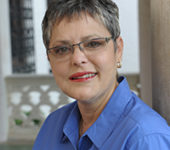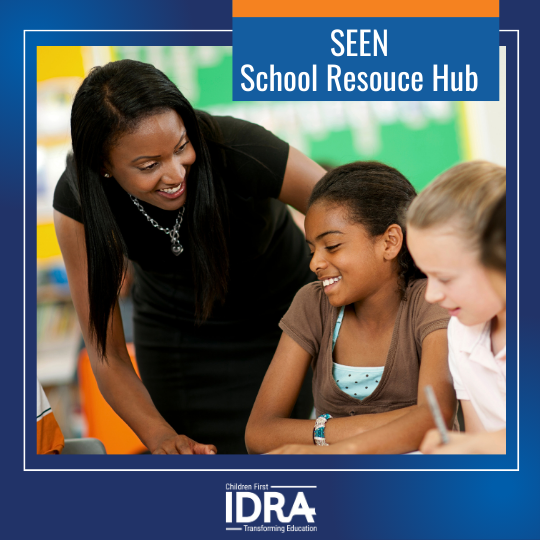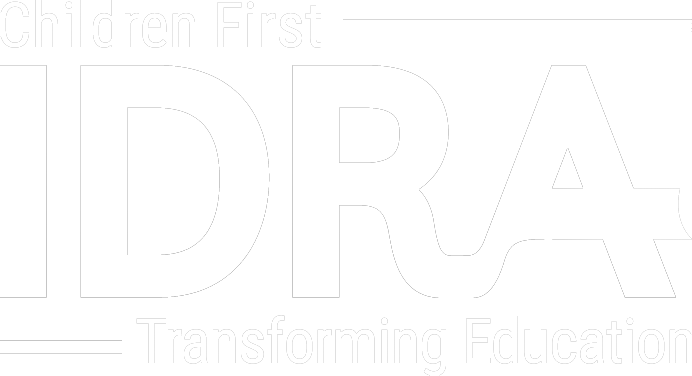• by Nilka Avilés, Ed.D. • IDRA Newsletter • November – December 2015 •
 After launching the IDRA Coca-Cola Valued Youth Program at their school in the Bronx, teachers and students began to notice a transformation throughout the campus. As the program’s tutors were being valued, educators were nurturing and cultivating students’ inherent abilities. As a result, teachers’ efficacy also began to blossom as they worked with their at risk population.
After launching the IDRA Coca-Cola Valued Youth Program at their school in the Bronx, teachers and students began to notice a transformation throughout the campus. As the program’s tutors were being valued, educators were nurturing and cultivating students’ inherent abilities. As a result, teachers’ efficacy also began to blossom as they worked with their at risk population.
The PS/MS 279 Captain Manuel Rivera Jr. school in New York City started implementation of the IDRA
Coca-Cola Valued Youth Program in 2013-14. The core team of leaders included the principal, Jean Dalton; the teacher coordinator, Michele Coyle; Melodie Mashel, district superintendent; Elizabeth Iadavaia, NYC Department of Education academic coach; and Dr. Anne Rothstein, partner from CUNY Lehman College. Through their leadership in the school, students have increased attendance, have a positive self-concept, and have shown a greater commitment to staying and succeeding in school. They also increased their aspirations and expect to seek a post-secondary career, expanding their vision in life as positive role models and contributing members of their community.
Eighth grade tutor Juan Sánchez said: “I started to be more responsible and to be more available to help my tutees. And that helps me a lot, because my teachers taught me that if you help somebody then that can help you too.”
Johan Servones, a seventh grade tutor added: “I think being in the Coca-Cola Valued Youth Program has been the best experience I’ve had in my life. The program helped me improve my grades. And it helps you think about what you want to do about your future, your life. And that’s what I will share with others.”
Other students began to ask about the program, which had funding for only a set number of students. The school leadership team decided to explore ways to create other levels of leadership among the student body to engage more students in giving back to the community, demonstrating their skills and uplifting their social, emotional character and academic ethical behavior.
Teachers’ efficacy is very powerful as it brings about student engagement and achievement in the midst of their life circumstances. PS/MS 279 teachers demonstrated their openness to the staff development provided by IDRA as they began to build a college-going and readiness culture among all of their students. Through interaction and relationship building, teachers are now more open to try new ideas and lessons that have been shared with them.
An eighth grade teacher told us: “I enjoyed your professional development because the lessons are meaningful, practical and relevant. You provide us with all the activities and materials ready for implementation. We also did the lesson as participants, and now all we have to do is implement the lesson with our own students.”
Mrs. Coyle has seen first-hand the students’ growth: “The Coca Cola Valued Youth Program gave us not only a framework and an opportunity for our students, but it also gave us something our school community was thirsty for, a positive purpose for our students to be proud of themselves as community contributors.”
Principal Dalton, along with the leadership team, uses data and systems to monitor teacher effectiveness and student achievement to ensure students are succeeding in school. Having grown up in the Bronx, she can identify with the students and families of the community: “I focus on the assets of my community of practice to bolster literacy, critical thinking and problem solving along with the exposure to college for students who may not have seen graduation and college as a possibility. I also work with the parents and students to ensure they have a safe place to be, where they feel valued, cared for and are taught to believe in themselves.”
The school staff provide the foundation for students to learn in a supportive environment so that they can make productive decisions. They have emphasized the importance of boosting family communication, valuing their children and increasing interpersonal skills in a school collaborative partnership and supportive environment.
Parents are excited for their children to participate in the Coca-Cola Valued Youth Program, and they have experienced how it has helped their children become better students and improved the interactions among the members of the family at home. With a lot of pride they have shared: “My son now helps his siblings with school homework, helps others and is more serviceable with people”; “After being in the Coca-Cola VYP program, since my daughter has been tutoring other children, she has learned how to relate with others, is more communicative, has more friends at school, and is now more patient with her autistic sister”; “My daughter has become more responsible and trustworthy.”
The IDRA Coca-Cola Valued Youth Program uses a philosophical base, core components and support components that emphasize student and family engagement – vital elements for the success of the students. The program works in partnership with the school, community and higher education institutions focusing on classroom engagement, academic high expectations, and emotional and social support of students and their families to attain positive outcomes, as part of its research base (Gonzalez & Ballysingh, 2012; Martinez & Cervera, 2012). Reflecting the funds of knowledge framework (Gonzalez & Moll, 2002), social and cultural capital and support networks are three subcomponents of the funds of knowledge linked to rigor, relationships and relevance which are now part of PS/MS 279 school culture (Contreras, 2011; Howard, 2010).
Research indicates that efforts to address students’ disengagement that lead to dropout rates must be systemic. Systemic renewal is an ongoing process of evaluating goals and objectives related to school policies, practices, organizational structures and the impact on a diverse group of learners (Avilés & Villarreal, 2015).
This successful dropout prevention program bridges research and practice in a way that is influencing classroom practices enabling the school and district administration to improve the quality of students’ education (Cárdenas, et al., 2008). Through collective impact- and equity-oriented practices that embrace social and cultural capital, teachers have built their capacity to embrace transformational and distributed leadership modeled by Mrs. Dalton and Mrs. Coyle.
As a result, students are gaining self-respect, self-confidence, and the academic content knowledge and skills to navigate school and the college world successfully. Affording educational opportunities to students from diverse social and economic backgrounds through the Coca-Cola Valued Youth Program provides a powerful model for educators and others interested in decreasing dropout rates, widening access to higher education and eradicating the achievement gap as we prepare our students to be competitive and productive in our global economy.
Resources
Avilés, N., & A. Villarreal. “Advancing the Culture of Promise and Possibility,” IDRA Newsletter (San Antonio, Texas: Intercultural Development Research Association, February 2015).
Cárdenas, J.A., & M. Robledo Montecel, J. Supik, R.J. Harris. “The Coca Cola Valued Youth Program: Dropout Prevention Strategies for At Risk Students,” Texas Researcher (Winter 1992).
Contreras, F. “Strengthening the Bridge to Higher Education for Academically Promising Underrepresented Students,” Journal of Advanced Academics (May 2011).
Gonzalez, N., & L. Moll. “Cruzando el Puente: Building Bridges to Funds of Knowledge,” Educational Policy (2002).
Gonzalez, K.P., & T.A. Ballysingh. “Increasing Latina/o College Completion: Mistakes and Opportunities,” Journal of Hispanic Higher Education (2012).
Howard, T.C. Why Race and Culture Matter in Schools: Closing the Achievement Gap in America’s Classrooms (New York, N.Y.: Teachers College Press, 2010).
Martínez, S., & Y.L. Cervera. “Fulfilling Educational Aspirations: Latino Students’ College Information Seeking Patterns,” Journal of Hispanic Higher Education (2012).
Pinterest. “What tutors have to say about the Coca-Cola Valued Youth Program“.
YouTube Video. “Ensuring High Teaching Quality to Tap Into Students’ Strengths, An interview with Jean Dalton Encke,” (December 23, 2014).
Nilka Avilés, Ed.D., is a senior education associate in IDRA’s Department of Student Access and Success. Comments and questions may be sent to her via email at nilka.aviles@idra.org.
[©2015, IDRA. This article originally appeared in the November – December 2015 IDRA Newsletter by the Intercultural Development Research Association. Permission to reproduce this article is granted provided the article is reprinted in its entirety and proper credit is given to IDRA and the author.]


